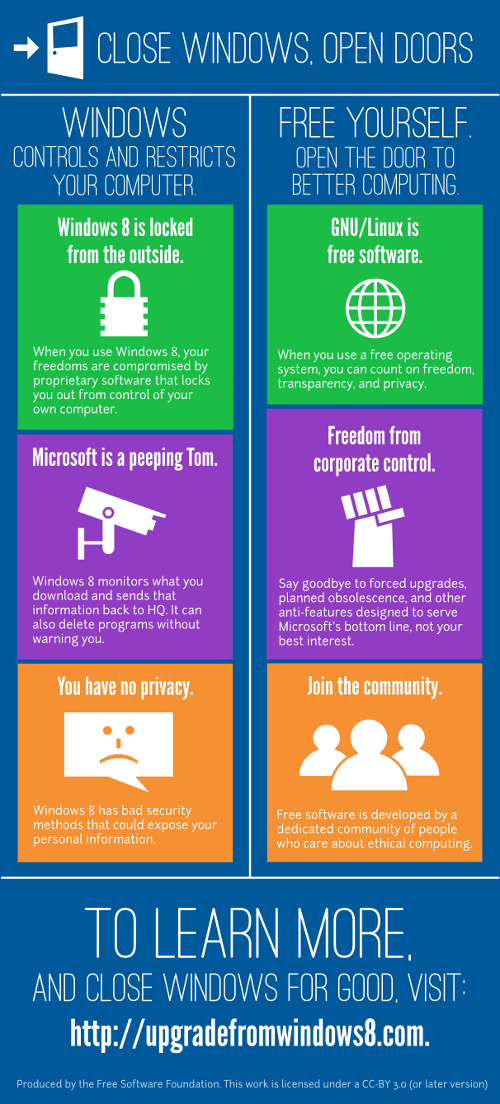BOSTON, Massachusetts, USA — Tuesday, April 30th, 2013 — The Free Software Foundation (FSF) today awarded Respects Your Freedom (RYF) certification to the TPE-N150USB Wireless N USB Adapter, sold by ThinkPenguin. The RYF certification mark means that the product meets the FSF's standards in regard to users' freedom, control over the product, and privacy. The TPE-N150USB can be purchased from http://www.thinkpenguin.com/TPE-N150USB. Software certification focused primarily on the firmware for the Atheros AR9271 chip used on the adapter.
ThinkPenguin's founder and CEO, Christopher Waid, accepted the certification: "ThinkPenguin, Inc. was founded with the goal of making free software more easily adoptable by the masses. Today I'm proud to say we are one step closer in achieving that goal. Not only do we have a product catalog that works with free software, but there is a reputable certification process to help users distinguish the good from the bad."
Only a handful of 802.11 wireless devices have both free software drivers and free firmware, so the need for wireless networking cards has been a major obstacle preventing people from running a completely free GNU/Linux operating system. Additionally, because many machines now come with a blacklist in their boot firmware that severely limits what internal wireless cards users can install, external USB devices are sometimes the best or only option.
Furthermore, even when a given wireless device is supported by free software, few sellers of such devices publish that information. The FSF supports http://h-node.org, a database of hardware compatible with free software, as a resource where users can find and share information about compatibility to help their purchasing decisions. But RYF certification goes beyond that. It is reserved for companies who promise not only that their certified device is and will continue to be compatible with free software operating systems, but also to promote this fact to their potential customers.
The TPE-N150USB Wireless N USB adapter chipset, Atheros AR9271, was developed by Qualcomm Atheros (QCA).
FSF's executive director, John Sullivan, said, "The FSF is grateful to the QCA team for publishing the firmware for this device as free software. Much credit also goes to Christopher Waid of ThinkPenguin for his central role in making this collaboration successful. At QCA, we especially want to acknowledge Adrian Chadd for his development work on the firmware and driver, and Luis Rodriguez for his related legal and policy work. We hope others will follow the example set by these two companies working together."
Once QCA published the firmware, free software developers, including Jason Self, Rubén Rodríguez, and Alexandre Oliva, completed the work of packaging it as part of the Linux-libre kernel for Trisquel, Parabola GNU/Linux, and other FSF-endorsed distributions.
The TPE-N150USB is the second product to be awarded RYF certification. The first certification was awarded in October 2012 to the LulzBot AO-100/AO-101 3D printer sold by Colorado-based Aleph Objects, Inc.
To learn more about the Respects Your Freedom hardware certification, including details on the certification of the TPE-N150USB Wireless N USB adapter, as well as information on the driver and firmware for the device, visit http://www.fsf.org/ryf. Hardware sellers interested in applying for certification can consult http://www.fsf.org/resources/hw/endorsement/criteria.
Subscribers to the FSF's Free Software Supporter newsletter will receive announcements about future Respects Your Freedom products.
Licensing & Compliance Manager
Free Software Foundation
+1 (617) 542 5942 x20 licensing@fsf.org
Media Inquires
ThinkPenguin, Inc.
+1 (888) 39 THINK (84465) x703
media@thinkpenguin.com
###
ThinkPenguin's founder and CEO, Christopher Waid, accepted the certification: "ThinkPenguin, Inc. was founded with the goal of making free software more easily adoptable by the masses. Today I'm proud to say we are one step closer in achieving that goal. Not only do we have a product catalog that works with free software, but there is a reputable certification process to help users distinguish the good from the bad."
Only a handful of 802.11 wireless devices have both free software drivers and free firmware, so the need for wireless networking cards has been a major obstacle preventing people from running a completely free GNU/Linux operating system. Additionally, because many machines now come with a blacklist in their boot firmware that severely limits what internal wireless cards users can install, external USB devices are sometimes the best or only option.
Furthermore, even when a given wireless device is supported by free software, few sellers of such devices publish that information. The FSF supports http://h-node.org, a database of hardware compatible with free software, as a resource where users can find and share information about compatibility to help their purchasing decisions. But RYF certification goes beyond that. It is reserved for companies who promise not only that their certified device is and will continue to be compatible with free software operating systems, but also to promote this fact to their potential customers.
The TPE-N150USB Wireless N USB adapter chipset, Atheros AR9271, was developed by Qualcomm Atheros (QCA).
FSF's executive director, John Sullivan, said, "The FSF is grateful to the QCA team for publishing the firmware for this device as free software. Much credit also goes to Christopher Waid of ThinkPenguin for his central role in making this collaboration successful. At QCA, we especially want to acknowledge Adrian Chadd for his development work on the firmware and driver, and Luis Rodriguez for his related legal and policy work. We hope others will follow the example set by these two companies working together."
Once QCA published the firmware, free software developers, including Jason Self, Rubén Rodríguez, and Alexandre Oliva, completed the work of packaging it as part of the Linux-libre kernel for Trisquel, Parabola GNU/Linux, and other FSF-endorsed distributions.
The TPE-N150USB is the second product to be awarded RYF certification. The first certification was awarded in October 2012 to the LulzBot AO-100/AO-101 3D printer sold by Colorado-based Aleph Objects, Inc.
To learn more about the Respects Your Freedom hardware certification, including details on the certification of the TPE-N150USB Wireless N USB adapter, as well as information on the driver and firmware for the device, visit http://www.fsf.org/ryf. Hardware sellers interested in applying for certification can consult http://www.fsf.org/resources/hw/endorsement/criteria.
Subscribers to the FSF's Free Software Supporter newsletter will receive announcements about future Respects Your Freedom products.
About the Free Software Foundation
The Free Software Foundation, founded in 1985, is dedicated to promoting computer users' right to use, study, copy, modify, and redistribute computer programs. The FSF promotes the development and use of free (as in freedom) software — particularly the GNU operating system and its GNU/Linux variants — and free documentation for free software. The FSF also helps to spread awareness of the ethical and political issues of freedom in the use of software, and its Web sites, located at fsf.org and gnu.org, are an important source of information about GNU/Linux. Donations to support the FSF's work can be made at http://donate.fsf.org. Its headquarters are in Boston, MA, USA.About ThinkPenguin, Inc
Started by Christopher Waid, founder and CEO, ThinkPenguin, Inc. is a consumer-driven company with a mission to bring free software to the masses. At the core of company is a catalog of computers and accessories with broad support for GNU/Linux. The company provides technical support for end-users and works with the community, distributions, and upstream projects to make GNU/Linux all that it can be.Media Contacts
Joshua GayLicensing & Compliance Manager
Free Software Foundation
+1 (617) 542 5942 x20 licensing@fsf.org
Media Inquires
ThinkPenguin, Inc.
+1 (888) 39 THINK (84465) x703
media@thinkpenguin.com
###


